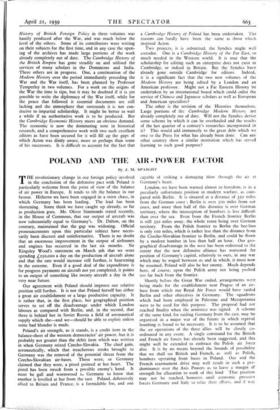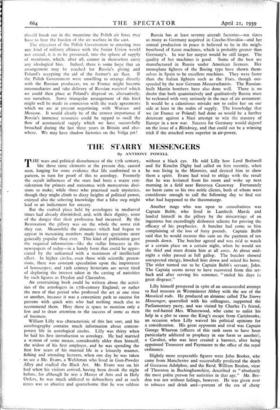POLAND AND THE AIR - POWER FACTOR
By J. M. SPA1GHT HE revolutionary change in our foreign policy involved in the conclusion of the defensive pact with Poland is particularly welcome from the point of view of the balance of air power in Europe. It tends to tilt the balance in our favour. Hitherto we have been engaged in a stern chase, in which Germany has been leading. The lead has been shortening. Some think we have caught up already, so far as production goes. Mr. Oliver Simmonds stated recently, in the House of Commons, that our output of aircraft was now substantially equal to Germany's. Dr. Dalton, on the contrary, maintained that the gap was widening. Official pronouncements upon this particular subject have neces- sarily been discreet and uninformative. There is no doubt that an enormous improvement in the output of airframes and engines has occurred in the last six months. Sir Kingsley Wood's statement on March 9th that we were spending £250,000 a day on the production of aircraft alone and that the rate would increase still further, is heartening in the extreme. Even if a good deal of the expenditure is for progress payments on aircraft not yet completed, it points to an output of something like twenty aircraft a day in the very near future.
Our agreement with Poland should improve our relative position still further. It is not that Poland herself has either a great air establishment or a large productive capacity. It is rather that, in the first place, her geographical position serves to set off the disadvantage under which London labours as compared with Berlin, and, in the second, that there is behind her in Soviet Russia a field of aeronautical supply which she—and we—should be able to exploit unless some bad blunder is made.
Poland's air strength, as it stands, is a credit item in the balance-sheet of the western democracies' air power, but it is probably not greater than the debit item which was written in when Germany seized Czecho-Slovakia. The chief gain, aeronautically, which that treacherous stroke brought to Germany was the removal of the potential threat from the Czecho-Slovakian air-bases. These were, or Germany claimed that they were, a pistol pointed at her heart. The pistol has been struck from a possible enemy's hand. It must be gall and wormwood tu Germany to know that another is levelled at her from the east. Poland, defensively allied to Britain and France, is a formidable foe, and one capable of striking a damaging blow through the air at Germany's heart.
London, we have been warned almost to boredom, is in a peculiarly unfortunate position in modern warfare, as com- pared with Berlin. It is situated at a distance of 350 miles from the German coast ; Berlin is over 500 miles from our coast, and more than half of this distance is over German territory, where the interception of bombers is less difficult than over the sea. Even from the French frontier Berlin is still 350 miles away, the whole route being over German territory. From the Polish frontier to Berlin the bee-line is only 100 miles, which is rather less than the distance from the Czecho-Slovakian frontier to Berlin, and could be flown by a modern bomber in less than half an hour. Our geo- graphical disadvantage in the west has been redressed to the extent that the new defensive alliance has worsened the position of Germany's capital, relatively to ours, in any war which may be waged between us and in which, it must now be assumed, Poland will also be her enemy. Much depends here, of course, upon the Polish army not being pushed too far back from the frontier.
Shortly before the Great War ended, arrangements were being made for the establishment near Prague of an air- base from which our Royal Air Force would have raided Berlin and other objectives in Germany. The squadrons which had been employed in Palestine and Mesopotamia were to be used for this purpose. The proposal had not reached finality when the armistice was signed. A scheme of the same kind, for raiding Germany from the east, may be organised in a major war of the future in which reprisal bombing is found to be necessary. It is to be assumed that the air operations of the three allies will be closely co- ordinated in any event. A single command for the British and French air forces has already been suggested, and this might well be extended to embrace the Polish air force also. It is by no means beyond the bounds of possibility that we shall see British and French, as well as Polish, bombers operating from bases in Poland. Our and the French rearmament drive may well result in such a pre- dominance over the Axis Powers as to leave a margin of strength for allocation to work of this kind That position may not be reached, however, until economic pressure forces Germany and Italy to relax their efforts. and if war. should break out in the meantime the Polish air force may have to bear the burden of the air warfare in the east.
The objection of the Polish Government to entering into any kind of military alliance with the Soviet Union would not extend, it is to be presumed, into the sphere of supply of munitions, which, after all, cannot in themselves carry any ideological bias. Indeed, there is some hope that an arrangement may be reached for Russia's giving and Poland's accepting the aid of the former's air fleet. If the Polish Government were unwilling to arrange directly with the Russian producers, we or France might become intermediaries and take delivery of Russian materiel which we could then place at Poland's disposal or, alternatively, use ourselves. Some triangular arrangement of this kind might well be made in connexion with the trade agreements which we are at present negotiating with• Warsaw and Moscow. It would clearly be of the utmost importance if Russia's immense resources could be tapped to swell the flow of aeronautical supply which we have successfully broached during the last three years in Britain and else- where. We may have shadow factories on the Volga yet! Russia has at least seventy aircraft, factories—ten times as many as Germany acquired in Czecho-Slovakia--and her annual production in peace is believed to be in the neigh- bourhood of 8,000 machines, which is probably greater than Germany's. In war her output would be still larger. The quality of her machines is good. Some of the best are manufactured in Russia under American licences. Her monoplane fighters of the Boeing type have shown them- selves in Spain to be excellent machines. They were faster than the Italian fighters such as the Fiats, though out- speeded by the new German Messerschmitts. The Russian- built Martin bombers have also done well. There is no doubt that both quantitatively and qualitatively Russia must be reckoned with very seriously in the race of air armament. It would be a calamitous mistake not to enlist her on our side at least in the realm of supply. The knowledge that we (or France or Poland) had done so mould be a further deterrent against a Nazi attempt to win the mastery of Europe in a new war. Success for Germany would depend on the issue of a Blitzkrieg, and that could not be a winning trick if the attacked were superior in air-power.











































 Previous page
Previous page